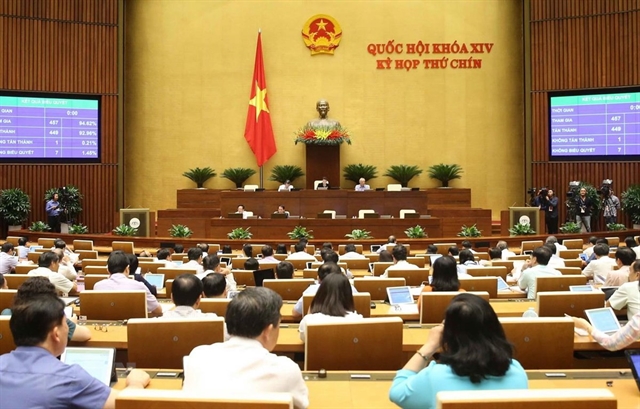 Politics & Law
Politics & Law


|
| The law amending and supplementing some articles of the Law on the Issuance of Legal Documents was passed by the National Assembly on Thursday with 449 out of 457 lawmakers voting in favour. — VNA/VNS Photo |
HÀ NỘI — The National Assembly on Thursday passed a law amending and supplementing the Law on the Issuance of Legal Documents with 449 out of 457 lawmakers voting in favour.
Notably, the NA ruled People’s Councils and People’s Committees at the district and communal level can issue legal documents.
Lê Thị Nga, chairwoman of the NA Judicial Affairs Committee, said the regulation would empower local administrations to make decisions on issues relevant to the socio-economic conditions of their locality.
The new law stipulates that legal documents can only be revised, supplemented, replaced or revoked by other legal documents of the State agencies which issued the old documents.
The documents announcing the revocation of legal documents must be published in public newspapers.
Handling administrative violations
In the morning session, lawmakers also looked into the draft law amending and supplementing the Law on Handling Administrative Violations.
While most deputies agreed on the enforcement of the law, they proposed the fine be raised to the maximum to deter violations.
Many deputies said administrative violations must be handled accordingly and that it was necessary to improve the related legal framework to ensure the rights of the people.
Deputy Lê Công Định from the northern province of Long An called for additional measures including community service or naming violating individuals and units.
Deputy Nguyễn Thị Mai Hoa from Đồng Tháp Province agreed that community service should be applied.
She said this kind of punishment would leave a direct impact on violators as well as on the community’s awareness. In some cases, administrative punishment was not effective as well-off violators could easily pay the fine, Hoa said.
Phan Thị Bình Thuận, a deputy from HCM City, said administrative punishment should be reviewed to ensure it was strong enough.
He emphasised that although administrative punishment was common, a penalty which was too low might not be a deterrent.
Many deputies voiced concerns over halting water and electricity supply to a unit as a punishment, saying it may lead to serious consequences.
Deputy Nguyễn Văn Hiển from Lâm Đồng Province said cutting off electricity and water might damage the property of violaters and innocents alike, which is beyond the enforcement requirement for handling administrative violations.
He suggested such a sanction should only be used for dealing with violations in construction, recreation services and producing or trading of contraband or banned goods.
According to deputy Nguyễn Sỹ Cương from Ninh Thuận Province, cutting off electricity and water was inhumane because there would be innocent victims.
“It is unwise to cutting off electricity when the weather is 40 degrees Celsius,” he said, adding that the measure should be applied to construction, not to production and trading units. — VNS




